Search engine optimization gets written about as a very complex, intricate marketing concept which then creates a high expectation for the results SEO produces. The last thing we want to do is imply SEO is not complex or minimize the expectations of what SEO can do, but we do want to communicate the concept that SEO is really doing only one thing for a website: bringing in more traffic. Traffic, users, site visitors, potential guests, or whatever label you have chosen to apply to the people who come to your website through organic search, are the result of SEO.
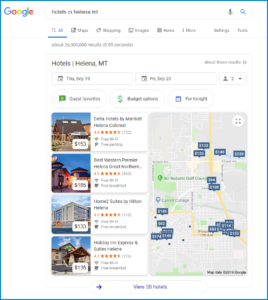 Local SEO is a specific subset of search engine optimization. It focuses on bringing organic search traffic to the website through the features on Google relating to the potential guest’s geographic position and geographic search. For example, a search for “hotels near me” requires Google to know where the potential guest is located (her geographic location), identified by IP address or cell phone location. Google can then serve up results related to her location. Additionally, she could have made the search “hotels in downtown Chicago” which does not rely on her current location. The search itself provides the location.
Local SEO is a specific subset of search engine optimization. It focuses on bringing organic search traffic to the website through the features on Google relating to the potential guest’s geographic position and geographic search. For example, a search for “hotels near me” requires Google to know where the potential guest is located (her geographic location), identified by IP address or cell phone location. Google can then serve up results related to her location. Additionally, she could have made the search “hotels in downtown Chicago” which does not rely on her current location. The search itself provides the location.
The results from these types of searches differ from other searches because Google will present a special section on the search engine results page often referred to as the Local Pack. You might hear this referred to as the Local 3-Pack, the Local 4-Pack, but really, does the number matter? No. It is the Local Pack and Google may change how many are in the pack over time.
How Does Google Decide Which Hotels to Put in the Local Pack?
We know there is a purpose behind the order that Google displays the hotels in the Local Pack. We also know that being the first is a very good thing. The question then must be asked: how do you become first?
As with anything related to Google, there is a bit of a mystery as to how their ranking system actually works. Very bright people poke, probe, and analyze how Google treats different sites and attempt to determine what makes one site rank better than another.
We do not want to go too deep into a history lesson, but at one point in time, Local SEO was all about NAPU – the name, address, phone number, and URL of the business. We attempted to get the hotel listed in as many directories as possible, making sure the name of the hotel, the address of the hotel, the phone number of the hotel, and the URL of the hotel were consistent across all of them.
What we were trying to do was build a threshold of confidence for Google to know that the hotel is in the location it claims to be. We all know hotels in suburbs to metro areas using the metro name in the name of their hotel. Google, at one time, believed if enough citations for the hotel were built using the same address, surely that address had to be accurate.
Google now has better ways to verify location information and that is through cell phone location data. Android users are sending Google location data constantly and with this data, they can reliably confirm the exact address of the hotel. They are no longer relying on the various citations built out because they have the location data from people’s phones. They know when people are at a location, they know if that location matches the location the business says they are at on Google My Business, Facebook, Yelp, and TripAdvisor, and they know how long people are at that location.
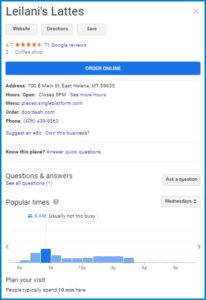
While Google does not show this information on the knowledge panels for hotels like they do for coffee shops, restaurants, and other businesses, it does not mean the information is not being collected.
Pause for a moment and let that soak in.
People carrying Android phones are sending location data to Google. Google can use this location data to learn about your hotel and the people coming to your hotel. Google even knows how much people are spending at your hotel thanks to their deals with credit card providers.
When Google wants more detailed information like whether the hotel has accessible parking or serves vegetarian options in its restaurant, Google uses a service called Local Guides, which rewards people for answering questions and leaving reviews for places Google tracked them to.
Business owners often have a reason to mislead or misrepresent their business and Google knows this so they rely on other people to verify the information it gets about your business. Google and people answering the questions do not always get it right, though. That is a cautionary tale for another time, but it is important to check-in once in a while on what Google is saying about your hotel in the knowledge graph and correct it when it is wrong.
What is important to Google now is the Google My Business listing, a few core search engine sources (e.g. Facebook, Bing, Apple Maps), and a handful of reputable citation sources (TripAdvisor, Yelp, FourSquare, etc.) especially directories related to the hospitality industry.
Beyond that, additional citations are barely moving the needle. This is not to say those additional citations are not helpful but is to say that the time and energy is better spent in other areas.
What Does Have an Impact on Local Pack Rankings?
Citations are a foundational element. Google expects the hotel’s accurate information to be published in specific places. Google expects the hotel’s Google My Business to be accurate and up-to-date.
If citations are not as significant as they once were, what is moving the needle for ranking in the local pack?
Reviews Impact Local Search Ranking
From Google’s point-of-view, it wants to deliver search results relevant to the person doing the search and will provide a great user experience. When the person doing the search has local intent (a clever way of saying “looking for a business or product related to a geographical area”.) Google wants to provide the searcher with good businesses close to the geographic area of the searcher.
When it is just a website, Google tries to display websites relevant to the search, mobile-friendly, malware-free, and not overly spammy in comparison to the other options. In terms of local search, Google wants to show businesses that are real-world equivalents of positive user experiences. Reviews are the easiest way to make this determination. Using people’s actual experiences to predict how future experiences will be.
How Does Google Use Reviews to Influence Local Search Rankings?
You may take a look at your Google Reviews for your hotel and see you have 600 total reviews and an average score of 4.7. That looks pretty good but for some reason, you are showing up in the second position in the Local Pack and the top position is a hotel with 300 reviews and an average score of 4.6.
Obviously, this disproves Google is using reviews as a ranking signal, right? Wrong.
Fresh reviews carry more weight than old reviews. A business will not have its rankings penalized because 4 years ago there was an issue that caused a flurry of bad reviews. If the issue has been corrected and there are nothing but good reviews coming in, then the user experience is going to be just fine and Google will have greater confidence in showing the hotel as a result for searchers.
This goes the other way, as well. A hotel that once had a sterling reputation and garnered nothing but positive reviews suddenly gets nothing but negative reviews will see its ranking drop. Google will not be confident about sending someone to the hotel.
Encouraging guests to leave reviews is an important part of improving and maintaining your local search ranking.
The one thing you can do to encourage reviews is to respond to reviews. Not just negative reviews, but all reviews. People are more likely to leave a review if they know it is going to be read. Responding to reviews is how you show the review is being read, that the review is having an impact.
Negative reviews obviously need to be addressed, and once addressed, if you feel you left the guest happier than they were when they left the review, you can ask them to adjust the review to reflect their new condition. You might not get a 5-star review out of the interaction but it can turn a 1-star into a 3-star.
Business Name Impacts Local Search Ranking
Much to the chagrin of many marketers, Google does take into account the name of the business in terms of ranking signals which means it is still possible to keyword stuff your business name on Google maps to get a ranking boost in local search. We have not been able to find examples of hotels doing this in search, but there are countless examples of this within the SEO industry, personal attorneys, locksmiths, and car towing.
This is not a criticism or indictment against any company using this loophole, but it is something every search marketer needs to understand how it is being done. For example, we can do a search for “SEO Agency” and get a list of agencies near us.
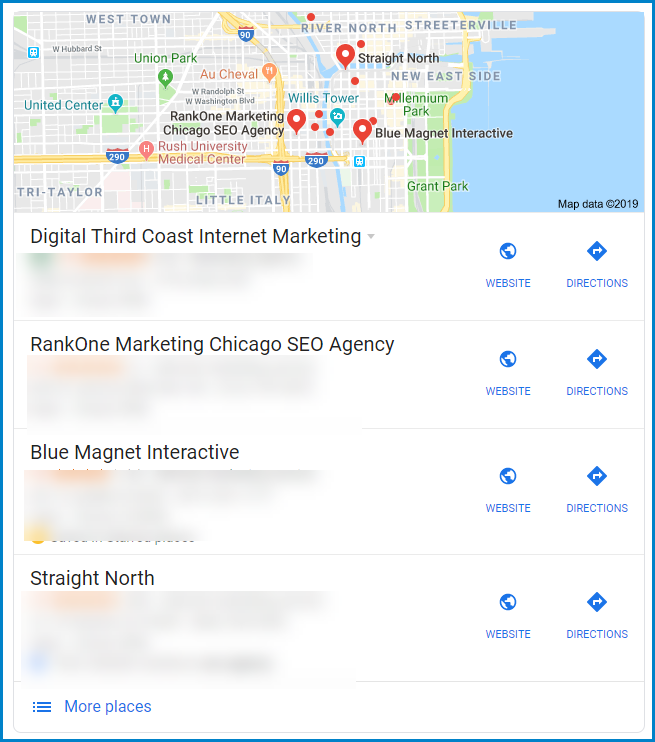
In that list, we see an agency with the name RankOne Marketing Chicago SEO Agency. When we click on their website, we see the actual name of the business is different.
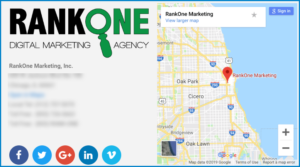
This is a relatively mild example of keyword use in the business name, but Google has been struggling to crack down on this even though their terms of service make it clear this is unacceptable. One of the many reasons why we do not employ this tactic is because it is against Google’s terms of service and when they do get reports of violations, the accounts are suspended.
In the effort to “do no harm,” Blue Magnet Interactive does not use this tactic, instead, we focus on evergreen, long term tactics, instead of trying to game a loophole that we know will be closed eventually. The time spent in trying to exploit and then undo damages wastes small marketing budgets.
Content Impacts Local Search Ranking
The fact the content on the website has an impact on local search rankings should come as no surprise. Content is the fuel for everything. If you want your hotel website to rank well for “hotel in Miami, Florida” then your website needs to contain content related to a hotel and Miami.
Links Impact Local Search Rankings
As with content, the fact that links are a ranking signal for local search should not be a surprise. Links are authority and authority helps boost relevant content to the top. We trust the relevant content from a high authority site over a low authority site. Links are how Google determines which websites have authority and which websites do not.
To improve ranking in local search results, the hotel needs to get links not only from the standard directories and hotel listings but also from other local businesses and organizations. Nearby universities, hospitals, corporations, and major tourist attractions are all potential sources of links for a hotel.
Most hotels have already gained these links if they have been around for any amount of time. Other links to consider can come from local influencers. Bloggers who write about your city can be invited to the hotel and encouraged to write and link to the hotel. Influencer marketing is a powerful way to not only acquire new links but create strong referral traffic to your website.
Use the Entire Search Engine Results Page
At one point in time, I played intramural basketball in school. I barely remember any of the coaching I received during that time, but one piece of advice has stuck with me.
“Use the entire court.”
When I played, I had a tendency to stick to one side of the court, post up in the exact spot I knew I could get a jump shot, and pretty much ignored the rest of the action. This was the territory I knew and this was the territory I was sticking to. The other team was taking advantage of the areas not being covered and the other team knew exactly how to disrupt my attempts at scoring.
You can extrapolate the idea of the court to the whole search engine results page.
Let’s look at what appears on the results page when someone does a search with local intent and a search directly for your hotel.
A Search With Local Intent: Hotels in Helena, MT

The results page (our basketball court) in this case is broken down into 4 distinct zones.
Paid Results
At the top of all the results are ads, the paid placements. These are websites paying to be in this position. Before any other search element is considered, the searcher is seeing these ads. This can be an expensive zone to compete in and the return on ad spend can be questionable for some areas of the country. You just have to know that if you are not playing in this area, you are giving control of it to OTAs and your competition.
Local Pack
The Local Pack (Snack Pack or 4-Pack) and this is what we traditionally think of in terms of Local SEO. Being included in the 4 hotels listed requires your hotel to be close to the geographic area being searched, having fresh positive reviews, and having the keyword in the name of your business.
Organic Search Results
These results are the traditional search results. You compete in the organic results by being relevant to the search term and having authority for the search term. Traditional SEO strategies are all you need. What is important to note is how many organic links are actually present on the page. In this example, there are only 7 traditional organic links. Organic SEO is still an important part of ranking, but it is easy to see that with fewer organic results to compete for on the first page of search results, the competition is more difficult.
Paid Results
The last part of the results page is more ads. On a standard search engine results page, there are a lot of opportunities to display ads. You do not have to compete for every keyword with ads, but there are certain keyword phrases that lead to bookings and for those opportunities, you need to seriously think about “using the entire court.” By allowing your competition unhindered access to these sections of the search engine results page, you are losing bookings.
Competing For Your Own Brand
Even when someone is searching directly for your hotel, you would think that it would be an easy victory. It is not. Even that results page comes with competition. This is one good reason why you need to have a branded keyword PPC campaign as well.
The Knowledge Graph

When someone searches for your hotel, your hotel is featured prominently on the results page with this knowledge graph section. In this section that is supposedly all about your hotel, Google does not give you the full chance to get the booking.
The “Book a Room” button does not take the searcher to your website or to your booking engine. It starts a process by which the searcher is shown over 10 websites (OTAs) she can use to book a room. These are places where the hotel ends up paying a commission for the booked room, in spite of the fact the searcher was looking for the hotel directly.
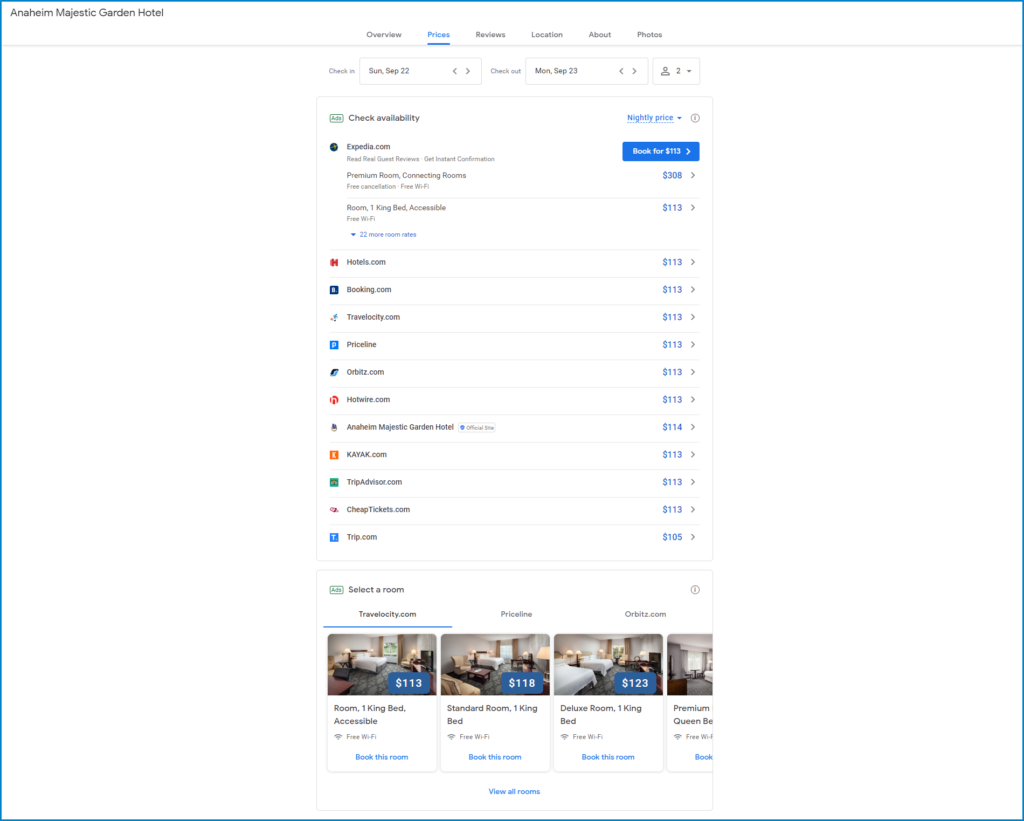
This section is referred to as Metasearch and the hotel can and should be competing here as well. This is a bid system and the details of how metasearch works can be seen in our blog post on metasearch for hotels. Not showing up in this metasearch section is forfeiting the booking to OTAs. In most cases, hotels are trying to do more to get direct bookings and not pay the OTAs for guests who would have come to the hotel anyway. Why would they concede these bookings to services that cut into their revenue?
Using the Entire Search Engine Results Page to Compete for Guests
Ranking for searches with local intent relies upon 3 key elements.
- Relevance to the search being done.
- Proximity to the geographic location being searched.
- Fresh, positive reviews of the hotel.
Obviously, if someone is searching for a hotel, they do not want to see a restaurant come up as a search result. Relevance to the search is vital for being considered a good result.
Being near the geographic area being searched is also important for ranking. If your hotel is located many miles away from what Google has determined is the center of the geographical area being searched, then the hotel most likely will not come up in search.
This does not mean your hotel cannot compete in local search, it just means the hotel will need to target a more specific geographic area it is close to. Major cities are usually broken up into neighborhoods providing a more specific area to target for businesses in local search.
Finally, reviews play a significant role in ranking well in local search. Encourage guests to leave reviews of your hotel. Respond to positive and negative reviews to show people you are listening, and when addressing negative reviews, if at all possible, once the situation has been addressed, see if the reviewer will adjust the review to be more positive.
What if your hotel is still struggling to rank? It is time to realize there is a lot more area on the results page in which to compete. Using ads to get on the page when the hotel is not in the local pack is a good way to make sure you are still fighting for those bookings. Investing in SEO to increase relevance and authority will get the hotel in the organic search results, which eventually means performing better in the Local Pack. Using metasearch will also make sure guests looking directly for your hotel are not stolen by the OTAs.
Digital Marketing Solutions for Your Hotel
When there are only four spots to fill, the competition is intense and while a great Local SEO strategy can improve your ability to compete, it will not be an immediate victory. Your hotel needs to employ a full digital marketing strategy to compete on the results page. Use paid search options, strong relevant content with SEO, in concert with a Local SEO strategy which includes maintaining citations, optimizing Google My Business, and using reputation management to encourage more reviews.
Blue Magnet Interactive can provide you with assistance on using all of these hotel marketing services and more.




